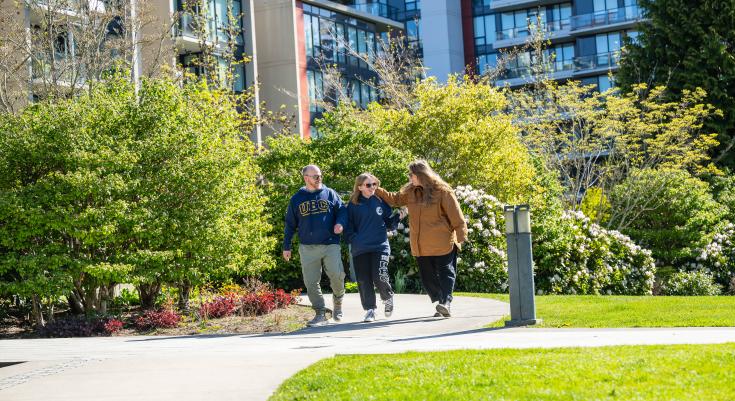
The UBC Board of Governors has approved the Neighborhood Climate Action Plan (NCAP), which sets a pathway to a net-zero and climate resilient community for the residential neighbourhoods on UBC’s Vancouver campus.
The approval follows two rounds of public engagement, which identified priorities, gaps and support the community needs to take climate action. A collaborative approach was taken to develop NCAP, including leveraging the expertise of staff and academics to develop actions and targets; working alongside the University Neighbourhoods Association (UNA) to propose tools and programming that support residents in taking climate action; and engaging UBC Properties Trust to ensure buildings and infrastructure are designed, built and operated in accordance with UBC’s sustainability plans.
As the university plans for growth through Campus Vision 2050 and with the increased intensity and frequency of local climate events brought on by the current climate crisis, NCAP identifies the additional immediate and long-term actions needed to continue progress on reducing greenhouse gas emissions in the neighbourhoods and to prepare as well as adapt for the impacts of a changing climate.
NCAP supports Campus Vision 2050 and Land Use Plan commitments towards climate action, including achieving the LUP commitment to defining a pathway to achieve net-zero operational emissions in new neighbourhood buildings no later than 2030, and will guide amended and future neighbourhood Plans.
NCAP Highlights
Emissions reductions and climate resilience will be achieved through actions in NCAP’s scope areas. Visit the NCAP website to download the full plan. Some actions include:
New Construction and Existing Buildings:
- Updating the Residential Environmental Assessment Program (REAP), UBC’s mandatory green building rating system, to implement NCAP objectives for new buildings, including: new buildings be designed to meet the Zero Carbon Step Code Zero Carbon target; establishing a cooling energy demand intensity target (2025); and implementing a minimum 40% embodied carbon reduction target (2030).
- Streamlining the permitting process for in-suite heat pump installations.
- After 2030, requiring low carbon equipment at time of replacement for space heating and hot water in existing buildings.
Transportation & Mobility:
- Continuing to plan and advocate for SkyTrain and expanded intra-campus and rapid transit.
- Improving cycling routes, sidewalks and transit stops to support safe and resilient transportation networks including shaded and covered shelters at public transit facilities and shading along walking and cycling routes and public misting stations.
- Supporting transition to zero emissions vehicles by expanding public electric vehicle charging infrastructure, including dedicated charging for car share, and providing resources to support retrofits of electric vehicle charging stations in existing buildings.
Waste, Materials & Consumables:
- Support UNA programming for community zero waste initiatives (e.g. sharing, re-use and repair).
- Require 90% diversion of construction and demolition waste in REAP (increasing from 85% currently).
Neighbourhood Infrastructure:
- Working with Corix Utilities in decarbonizing the Neighbourhood District Energy System (NDES).
- Updating the Integrated Rainwater Management Plan, focused on adaptive, green infrastructure (e.g., bioswales, detention ponds, rain gardens, etc.).
Ecology:
- Creating performance targets on neighbourhood shade coverage and implementing design strategies to address urban heat island effect.
- Through UBC's upcoming Biodiversity Strategy, planning for future climate projections and localized climate impacts to natural systems.
Climate Emergency Preparedness:
- Preparing for climate emergency events (e.g., extreme heat, wildfire and smoke, storms, flooding) by developing educational tools and resources and programming.
- Developing an emergency response plan for local wildfire events
- Supporting the UNA in expanding neighbourhood cooling centres.
Next Steps
NCAP is a living plan and will adapt and evolve over time, responding to the latest information, technologies, and a changing provincial and federal policy landscape. Implementation of NCAP will involve continued collaboration with the UNA, UBC Properties Trust and outside partners such as the City of Vancouver and BC Hydro. Actions will be implemented through a climate equity lens that looks to improve outcomes for all, while paying attention to who benefits, who bears the costs, and how we can better support vulnerable community members. Ongoing dialogue with the community, as well as learning and research opportunities with UBC’s academic community will also be essential in implementation, ensuring that the plan is responsive to feedback and able to take advantage of innovative solutions.
NCAP commits to regular monitoring and progress reporting to ensure UBC’s progress in meeting climate action commitments.
Stay Informed
Visit the NCAP website to learn more about the plan and sign up for the C+CP newsletter to stay informed on community programs and incentives to help take climate action.